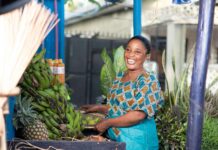The South African consumer has faced significant hardship over recent years because of an ailing economy, which has undermined their ability to afford basic food. This situation is creating a troubling chain reaction throughout the agricultural supply chain resulting in a depressed outlook, and has in part, led to alarming levels of food insecurity, according to recent data.
This is the view of Roelie van Reenen, supply chain executive at Beefmaster Group, who says that the decline in consumer demand is being driven by shrinking disposable income.
“Our food remains among the most affordable in the world. However, low economic growth, high unemployment, the rising cost of electricity, fuel expenses, and inflation are placing immense financial strain on consumers,” he says, adding data reveals that South Africa’s population growth has outpaced economic expansion over the past decade, compounding pressure on resources and services.
“This makes it increasingly challenging for people to access the nutritious food their families need, which in turn impacts the ability of food producers across the supply chain to get their products to market.”
This is echoed by findings from PwC, suggesting South Africans are buying less food owing to pressure on their buying power, with households having to spend money carefully on electricity, transport and other living expenses.
Furthermore, recent data reveals that South Africa is staring down the barrel of a gun when it comes to food insecurity, with some of the country’s poorest provinces at crisis level.
The National Food and Nutrition Security Survey (NFNSS) reveals a sobering reality – 63.5% of South African households – or about 20 million people – are affected by food insecurity. The survey, which was conducted across nine provinces in South Africa between 2021 and 2023, revealed that at provincial level the North West (72,7%), followed by KwaZulu-Natal (70,4%) and Mpumalanga (70,1%) are at crisis levels when it comes to food insecurity. The study says that more than 18% of households consume poor diets and survive on nutrient-poor food groups such as cereals, condiments, sugars, oils and fats. Interventions suggested by the study include encouragement of domestic food production as well as creation of jobs in the agriculture sector.
Meanwhile, the South African Food Security Index 2024, a report commissioned by the Shoprite Group and written by two economists from University of Stellenbosch, finds that 2023 marks South Africa’s lowest food security level in over a decade. The Index evaluates four dimensions of food security, namely availability, access, utilisation and overall stability, from 2012 to 2023. It finds that sufficient dietary diversity is required as an intervention to combat children being hungry. By 2023, 11.8% of households said they were consuming a lower variety of food than usual given economic constraints. One of its recommendations to solve the problem is for National Treasury to strongly consider zerorating VAT on certain key food products, especially protein-rich items. There is currently a process underway to reconsider the food items which are VAT-exempt and to potentially expand the zero-rated VAT list.
“We support adding beef protein sources to the zero-rated VAT list,” says van Reenen.
He says Beefmaster Group is encouraged by the easing of the consumer food price inflation until end September, as well as the recently announced decrease in the interest rate. The next interest rate announcement is expected to take place in November once the Reserve Bank’s (Sarb) Monetary Policy Committee has made a decision, and while many agree that there is a strong likelihood of a 25 basis points cut to bring needed relief for consumers, only time will tell.
“While there are trade-offs with every decision that is taken, we need to create an environment in which the consumer can access good, nutritious food,” concludes van Reenen.








